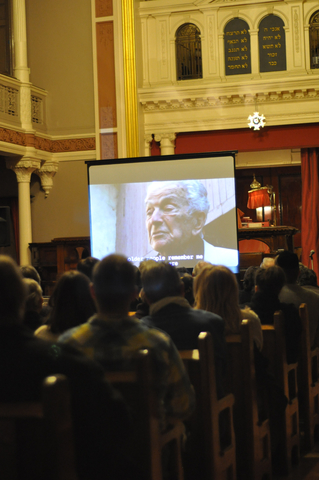Czwartek, 22 grudnia 2011
9 kultura
Ronald Stein i jego praca z autografami muzyków i osobistą dedykacją od Alfreda Schreyera
Rysunek Ronalda Steina, copyrights Ronald Stein
Na końcu chyba zagrali „Tylko we Lwowie". Musiało tak być, bo ostatni, którzy wychodzili z koncertu jeszcze nucili sobie pod nosem słowa tej najsłynniejszej bodaj z przedwojennych piosenek.
- Muszę was wszystkich ostrzec - powiedział do zebranych w New London Synagogue Alfred Schreyer - że ten koncert będzie retro, bo ja sam jestem retro - uśmiechnął się. A z nim wszyscy obecni. Mówił tą przepiękną polszczyzną, którą spotyka się chyba już tylko poza Polską, a która przypomina Lwów właśnie. Ale Alfred Schreyer nie przyjechał na swój recital z Lwowa, a z Drohobycza. Z miasta Brunona Schulza, na którego zajęcia z prac ręcznych uczęszczał przez cztery lata tuż przed wybuchem wojny.
Historię Alfreda Schreyera z Drohobycza, ucznia Brunona Schulza w dokumencie filmowym uwieczniła, we współpracy z Marcinem Giżyckim, Małgorzata Sady. Film, wyprodukowany w tym roku przez Kronikę Film Studio został wyświetlony przed koncertem Alfred Schreyer Trio w New London Synagogue w ubiegłym tygodniu. Później i koncert, i projekcje filmu powtórzono raz jeszcze w polskiej ambasadzie.
Jak zaznaczyła obecna tego wieczora Małgorzata Sady film powstał niejako z przypadku. Reżyserka, wraz ze słynnymi brytyjskimi twórcami filmowymi, braćmi Quay (obecnymi na koncercie Alfreda w synagodze), odwiedziła Drohobycz, żeby dowiedzieć się czegoś więcej o Brunonie Schulzu, odwiedzić jego miasto. Tam spotkała Alfreda Schreyera, którego losy i charyzmatyczna postać wydały się jej tak interesujące, że po-stanowiła nakręcić o nim film. Jeszcze podczas tych pierwszych odwiedzin w Drohobyczu powstał krótki dokument, na podstawie którego powstał film „Alfred Schreyer z Drohobycza". Dokument filmowy Małgorzaty Sady, oprócz przepięknych zdjęć, zawiera ścieżkę dźwiękową złożoną z utworów wykonywanych przez Schreyera i jego zespół. Bohater filmu opowiada o Drohobyczu, Schulzu, wojnie i rodzinie, którą podczas tej wojny stracił. Historie czasami bolesne, ale i też takie wywołujące uśmiech, choćby przez łzy. Film zawiera sporo materiałów archiwalnych, fotografii i niewyreżyserowanych dialogów - swoistych perełek, które stanowią o wartości tego dokumentu. Alfred Schreyer, opowiadając swoją historię, nie żali się - przedstawia fakty, czasem nawet ze swadą je komentuje. „Tyle lat na scenie - mówi - a głos wciąż ten sam. Co ja na to poradzę, że wciąż się mnie trzyma?"
„Gdy Dorota gra fokstrota"
Wieczór, organizowany przez Spiro Ark i Instytut Kultury Polskiej w Londynie prowadziła Nitza Spiro która - już po koncercie - mówiła, że gdy po raz pierwszy zobaczyła Alfreda nie była pewna, czy leciwy śpiewak podoła trudom występu. Schreyer urodził się w 1922 roku, więc jej obawy nie były bezpodstawne, szczególnie po męczącej podróży śpiewaka z Drohobycza do Londynu. Jednak ku jej zasko¬czeniu, a może i kilku innych osób przybyłych na ten koncert, stwierdzenie Schreyera nie jest jedynie czczą przechwałką - głos naprawdę się go trzyma! I ta charyzma. Nią mógłby obdzielić kilku współczesnych piosenkarzy. „Muzyka i koncerty dodają mu sił" - stwierdziła po recitalu Małgorzata Sady. I nie da się ukryć, że Alfred Schreyer to człowiek Sceny, przez duże „S".
Występ Alfred Schreyer Trio zrobił prawdziwą furorę. Zrobiono mnóstwo zdjęć. Byli i tacy, którzy koncert nagrywali na telefony i kamery. W jednym z pierwszych rzędów siedział pan Ronald Stein, który w trakcie recitalu szkicował muzyków. Powstało kilka rysunków, na których Trio zgodnie złożyło swoje autografy. Można było odczuć, że wieczór był jednym z tych wyjątko¬wych.
Alfred Schreyer Trio w składzie: Lowa Łobanow (klawisze) i Tadeusz Serwatka (akordeon) i Alfred Schreyer (wokal i skrzypce), wykonało polskie przedwojenne szlagiery, popularne melodie żydowskie, piosenki w jidysz, po rosyjsku i po ukraińsku. Jak pięknie za¬znaczyła przed koncertem prowadząca wieczór Nitza Spiro, muzyka łączy różne kultury. I można powiedzieć, że Alfred Schreyer jest tego najlepszym przykładem.
Choć to Alfred jest niezprzeczalnym liderem grupy, to widać, że drohobyccy artyści są ze sobą bardzo zgrani i wspólne muzykowanie daje im dużo satysfakcji. Co doskonale wyczuli zgromadzeni słuchacze. Trio, ze szczególnym wkładem Alfreda, stworzyło tego wieczora niezapomnianą atmosferę. Dłonie same składały się do klaskania przy „Szalom Alejchem", a nogi skakały przy „Gdy Dorota gra fokstrota". Atmosfera z sekundy na sekundę zmieniała się przy kolejnych pieśniach, z beztroskiej, na smutną, z smutnej na liryczną, jak np. przy „Miasteczku Bełz". Słuchacze byli bezsilni - Schreyer dyrygował ich nastrojem. A kiedy wychodzili, każdy pod nosem nucił coś innego...
„Wspaniały koncert", „gratulacje" dało się słyszeć. Obecny na recitalu Jerzy Jarosz był pod tak wielkim wrażeniem, że zastanawiał się jakby tu drohobyckich muzyków sprowadzić na kolejne koncerty w nowym roku. Jeszcze zanim, z trudem uzyskane wizy, stracą ważność. Oby się udało, takiego koncertu warto posłuchać nie raz, ale i kilka razy.
Tekst i fot.:
Justyna Daniluk
Cóż ja zrobię, że głos
się mnie trzyma?
Alfred Schreyer, Małgorzata Sady, Tadeusz Serwatko i Nitza Spiro podczas koncertu Alfred Schreyer Trio w New London Synagogue
TRANSLATION
TITLE: Well what can I do, that the voice is still with me?
At the end they probably played "Only in Lvov." It had to be so, because the last who left the concert even sang quietly the words of this most famous perhaps of pre-war songs.
- I have to warn you all - he said to those gathered in New London Synagogue, Alfred Schreyer - that this concert will be retro, because I myself am a retro - he smiled. And with him all those present. He spoke using this especially beautiful Polish language that you can now usually hear abroad and that resembles Lvov. But Alfred Schreyer did not come to his recital of Lvov, and Drohobych. From the town of Bruno Schulz, whose technical workshops he attended for four years just before the outbreak of war.
The history of Alfred Schreyer from Drohobych, a pupil of Bruno Schulz was immortalized in the film document, in collaboration with Martin Gizycki by Malgorzata Sady. The film, produced this year by the Chronicle Film Studio was displayed before the concert of Alfred Schreyer Trio in New London Synagogue last week. Afterwards both the concert and the film screening were repeated once again at the Polish Embassy.
Malgorzata Sady who was present that evening movie was kind of case. The director, together with the famous British filmmakers, brothers Quay (Alfred present at the concert in the synagogue), visited Drohobych to learn more about Bruno Schulz, visit his city. There he met Alfred Schreyer, whose fate and charismatic figure seemed to her so interesting that it has decided to make a movie about him. Even during those first visits in Drohobych was a short document on which the film "Alfred Schreyer from Drohobycz". Document film Margaret's Orchards, in addition to beautiful photographs, includes a soundtrack consisting of songs performed by Schreyer and his team. The hero of the film tells the story of Drohobych, Schulz, war, and the family that lost during the war. The stories sometimes painful, but also those that cause a smile, even through tears. The film contains a lot of archival material, photographs and dialogues niewyreżyserowanych - specific beads, which represent the value of this document. Alfred Schreyer, telling his story, no complains - the facts, sometimes even with the zest it says. "So many years on stage - he says - and his voice is still the same. What I said help it, that keeps me still? "
"When Dorothy playing foxtrot"
The evening, organized by the Spiro Ark and the Polish Cultural Institute in London, who led Nitze Spiro - after the concert - said that when he first saw Alfred was not sure whether the singer will cope with an aging hardships performance. Schreyer was born in 1922, so her fears were unfounded does not, especially after a tiring journey from Drohobycz singer to London. But to her surprise, and perhaps a few other people who have come to the concert, Schreyer statement is not just worship boast - the voice kept him really! And this charisma. It could have been shared among the few contemporary singers. "Music and concerts add to the force" - said after a recital Malgorzata Sady. And there is no denying that this man Alfred Schreyer scenes, with a capital "S".
Alfred Schreyer Trio performance made a real sensation. Done a lot of pictures. There were those who live and recorded on camera phones. In one of the first row sat Mr. Ronald Stein, who sketched during a recital musicians. There are several drawings, in which according Trio made their autographs. You could feel that the evening was one of those exceptional.
Alfred Schreyer Trio composed of Lowa Lobanov (keyboards) and Tadeusz Whey (accordion) and Alfred Schreyer (vocals and violin), made the Polish pre-war hits, popular Jewish melodies and songs in Yiddish, Russian and Ukrainian. As stated before the concert beautifully leading evening Spiro Nitza, the music combines different cultures. I can say that Alfred Schreyer is the best example.
Although Alfred is an undeniable leader of the group, it shows that artists are drohobyccy together very Tune and Comne music-making gives them great satisfaction. What perfectly sensed gathered listeners. Trio, with special contribution of Alfred, has created an unforgettable atmosphere that evening. Hands to themselves consisted of clapping with "Shalom Aleichem" and jumped on his feet "when Dorothy foxtrot game." The atmosphere of the second by second modified by the subsequent songs, with the careless, the sad, the sad in lyric, like the "Miasteczko Belz." Listeners were powerless - Schreyer conducted their mood. And when he came out, everyone was humming under his breath something else ...
"Great Concert", "congratulations" was heard. Present at the recital of George Jarosz was so impressed that he wondered if there drohobyckich musicians bring to the next concert in the New Year. Even before, barely gained the visa will expire. Would have succeeded, this concert is worth listening to, not once, but several times.




